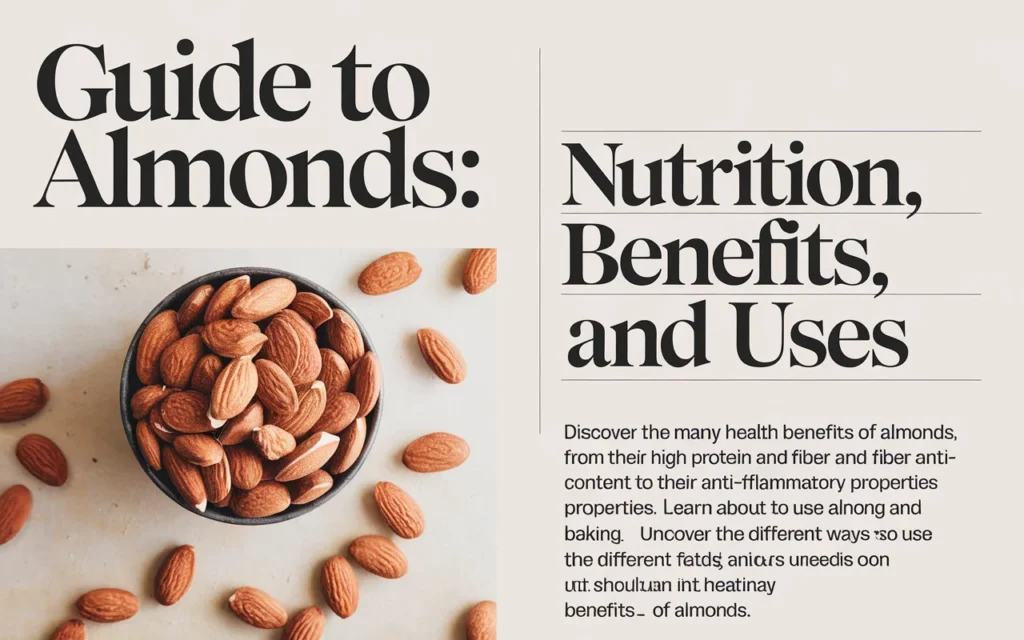Almonds: Nutrition, Benefits, and Uses
Key Takeaways:
- Almonds are a rich source of healthy fats, protein, fiber, and essential nutrients.
- Regular consumption can improve heart health, aid in weight management, and support brain function.
- Almonds are versatile, used in snacks, cooking, and skincare products.
- Consuming almonds in moderation provides numerous health benefits without excessive calorie intake.

Almonds: A Nutritional Powerhouse
Almonds are widely regarded as a superfood due to their exceptional nutritional profile. Packed with vitamins, minerals, and antioxidants, almonds have been a staple in various cultures for centuries. Here’s a breakdown of the key nutrients found in a 1-ounce (28-gram) serving of almonds:
Nutritional Breakdown per 1 Ounce (28 grams)
| Nutrient | Amount |
|---|---|
| Calories | 160 kcal |
| Protein | 6 grams |
| Fat | 14 grams (9 g healthy fats) |
| Carbohydrates | 6 grams |
| Fiber | 3.5 grams |
| Vitamin E | 7.3 mg (37% DV) |
| Magnesium | 76 mg (19% DV) |
| Calcium | 76 mg (8% DV) |
Health Benefits of Almond Nutrients
- Vitamin E: A powerful antioxidant that supports skin health and may reduce the risk of heart disease.
- Magnesium: Vital for muscle function and heart health, magnesium also helps in regulating blood sugar levels.
- Fiber: Supports digestive health and promotes a feeling of fullness, which can aid in weight management.
- Healthy Fats: Almonds contain monounsaturated fats that contribute to lower cholesterol levels and improved heart health.
The Health Benefits of Almonds
Almonds offer a range of health benefits that make them a great addition to any diet. From promoting heart health to aiding in weight management, here are some of the key health benefits backed by research.
1. Heart Health
Regular consumption of almonds has been linked to improved cardiovascular health. The monounsaturated fats, vitamin E, and antioxidants found in almonds help reduce LDL cholesterol levels (the “bad” cholesterol) and increase HDL cholesterol (the “good” cholesterol), which can lower the risk of heart disease.
“Almonds are one of the best natural sources of vitamin E, which plays a critical role in reducing oxidative stress, a key factor in the development of cardiovascular diseases,” says Dr. Sarah Wilcox, a clinical nutritionist.
2. Weight Management
Despite being calorie-dense, almonds can support weight management efforts. The combination of protein, fiber, and healthy fats in almonds promotes satiety, helping you feel fuller for longer and reducing the likelihood of overeating. Studies have shown that those who regularly consume nuts, including almonds, tend to have a lower body mass index (BMI) compared to those who do not.
3. Blood Sugar Control
For individuals with type 2 diabetes, almonds can be beneficial in managing blood sugar levels. The magnesium in almonds plays a key role in insulin regulation, helping to prevent spikes and dips in blood sugar levels. Additionally, the fiber and healthy fats slow down the absorption of sugar in the bloodstream, promoting stable glucose levels.
Almonds and Brain Health
Almonds have long been associated with improved cognitive function, especially in older adults. Here’s how almonds contribute to better brain health:
1. Vitamin E and Cognitive Function
The antioxidant properties of vitamin E protect cells from oxidative damage, including brain cells. Regular consumption of vitamin E-rich foods like almonds has been linked to a reduced risk of Alzheimer’s disease and age-related cognitive decline.
2. Riboflavin and L-carnitine
These two nutrients, found in almonds, have been shown to support neurological activity and prevent cognitive degeneration. They help promote healthy brain function, memory, and concentration.
Ways to Incorporate Almonds into Your Diet
Almonds are not only nutritious but also incredibly versatile. They can be eaten raw, roasted, or incorporated into various dishes. Here are some simple ways to include almonds in your daily meals:
1. Snacks and Meals
- On-the-go snack: A handful of raw or roasted almonds makes for a healthy, filling snack.
- Smoothies: Add a tablespoon of almond butter to your morning smoothie for a protein boost.
- Salads: Sprinkle chopped almonds over salads for added crunch and nutrition.
- Baking: Use almond flour as a gluten-free alternative in baked goods like muffins and pancakes.
2. Almond Milk and Almond Butter
Almond milk is a popular dairy alternative, especially for those who are lactose intolerant or following a plant-based diet. Almond butter, on the other hand, serves as a nutritious spread and can be used as a dip for fruits or as an ingredient in energy bars and smoothies.
Almonds in Skincare
Almond oil has been used for centuries for its skin-nourishing properties. Here are some benefits of using almond oil in your skincare routine:
1. Moisturizing Dry Skin
Almond oil is rich in vitamin E and fatty acids, which help lock in moisture and keep the skin hydrated. It’s commonly used to treat dry skin conditions, including eczema and psoriasis.
2. Reducing Dark Circles
Due to its anti-inflammatory and antioxidant properties, almond oil can help reduce the appearance of dark circles and puffiness around the eyes.
Are There Any Risks to Eating Almonds?
While almonds are beneficial, consuming them in large amounts can lead to potential side effects:
1. High Calorie Count
Almonds are calorie-dense, so overconsumption can contribute to weight gain. A moderate serving size of about 1 ounce (23 almonds) is recommended to avoid excess calorie intake.
2. Nut Allergies
Almonds are tree nuts, and those with nut allergies should avoid consuming them. Symptoms of almond allergies can range from mild reactions, such as itching and swelling, to severe reactions like anaphylaxis.
Conclusion
Almonds are a nutritional powerhouse that offers numerous health benefits, from heart health to brain function. Their versatility in cooking, snacking, and skincare makes them a valuable addition to anyone’s daily routine. While almonds are nutrient-dense, it’s important to consume them in moderation to avoid potential side effects like excess calorie intake or allergic reactions. By incorporating almonds into a balanced diet, you can enjoy their health benefits while maintaining a healthy lifestyle.
FAQ
Q: How many almonds should I eat per day?
A: It’s recommended to consume about 1 ounce (23 almonds) daily to reap the health benefits without consuming too many calories.
Q: Are roasted almonds as healthy as raw almonds?
A: Both raw and roasted almonds are healthy, but roasting can slightly reduce the vitamin E content. Opt for dry-roasted almonds without added oils or salts for the best nutritional value.
Q: Can almonds help in weight loss?
A: Yes, almonds can support weight loss by promoting fullness and reducing hunger. However, portion control is key due to their high-calorie content.
Q: Is almond milk a good alternative to regular milk?
A: Almond milk is a great plant-based alternative for those who are lactose intolerant or following a vegan diet. However, it contains less protein compared to cow’s milk, so ensure you’re getting protein from other sources.










